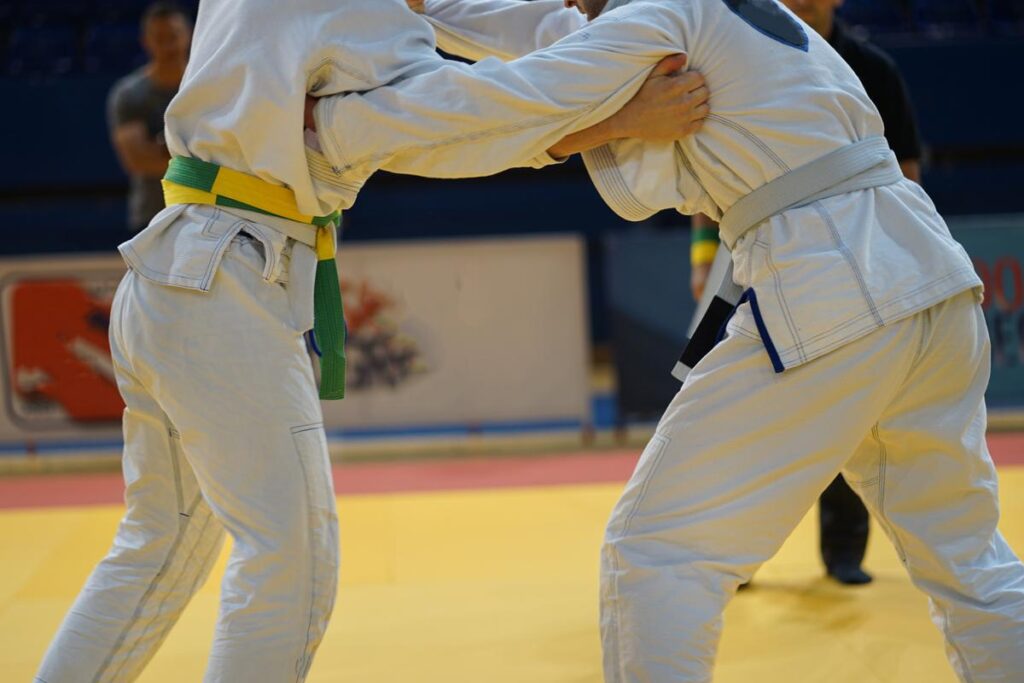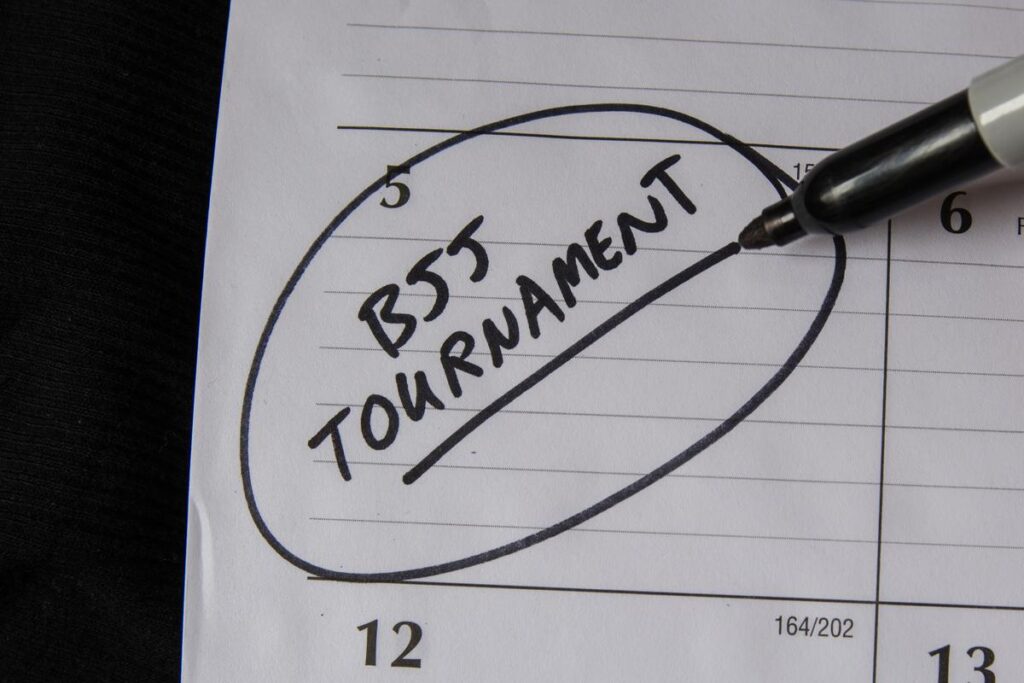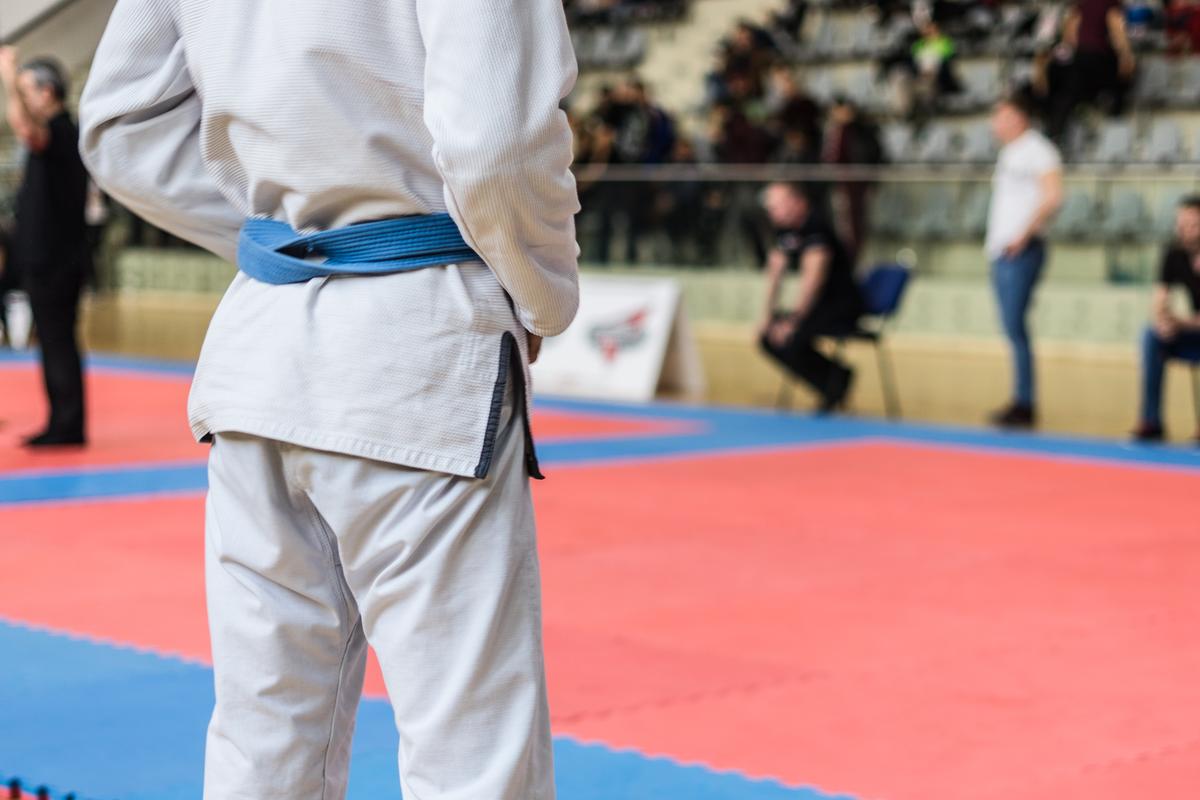Brazilian jiu-jitsu (BJJ) has exploded in popularity over the last few decades, leading to a surge in tournaments worldwide.
But for those new to the sport, the intricacies of how do BJJ tournaments work can be confusing.
This article will provide an in-depth overview of the end-to-end workflow of BJJ tournaments and how the competitive format allows competitors to progress through brackets from the initial weigh-ins to the finals.
We’ll examine how participants are divided into groups based on criteria like belt level, weight class, age and experience. Matches consist of submission attempts and positional scoring within a given time limit per BJJ rules.
Referees oversee the action, enforce regulations and declare winners. Competitors advance match-by-match through bracket eliminations or round robin format trying to reach the finals.
Winners earn gold, silver and bronze medals in their respective divisions. By learning the full tournament process, new BJJ students will be well prepared to test their skills in competition.
If you’re focusing on tournaments then you must have knowledge about How To Improve Half Guard Game BJJ also Are Wrist Locks Legal in BJJ?
Pre-Tournament Preparation

Well before stepping on the mats to compete, participants must go through several pre-tournament preparation steps. Proper planning and adherence to registration procedures ensures a smooth experience leading up to the event.
Choosing the Right Tournament Division
Most BJJ tournaments divide competitors into divisions based on:
- Belt level – white, blue, purple, brown, black
- Experience – beginner, intermediate, advanced
- Age groups – teens, masters etc.
- Gender
- Weight classes – follows standard BJJ weight brackets
- Gi vs No-Gi – uniform requirements differ
Choose the division that matches your rank, skills and physique to find the best matchups. Be realistic about your level – better to start in beginner than get in over your head.
Registration and Documents
Register well in advance before tournament deadlines at official competition websites or through your academy. Provide:
- Full name, academy affiliation and belt rank
- Age and date of birth
- Gender
- Email and contact details
- Photo ID may be required onsite for verification
- Signed liability waiver releasing organizers from injury claims
This ensures you are properly entered into the system. Register early as slots fill up quickly in popular divisions.
Making Weight Safely
Manage your weight in a healthy manner leading up to tournaments. Drastic last minute cuts carry risks like dehydration, fatigue and sickness.
Know which weight class you need to compete in and track weight weekly. Modify diet if required over several weeks. Limit but don’t eliminate carbs and fats. Stay hydrated.
Cut salt and eat clean the last 1-2 days if needed to shed a couple extra pounds. Don’t cut water which is dangerous.
Weigh-in Onsite
Show up well-rested and fueled on weigh-in day. Drink fluids up until 1-2 hours prior. Make weight as per your division limits to avoid disqualification.
Understanding Your Bracket
Analyze the bracket once published to see match schedules and opponents. Visualize your path to the finals.
Use downtime wisely to hydrate, fuel up, review strategies and sequences. Scope out future opponents. Stay mentally focused for your division.
Tournament Matches
The tournament matches themselves follow defined formats and rules to determine winners of each bracket. Here is an overview of how BJJ tournament matches unfold:
Length of Matches
The typical match length ranges from 6 to 10 minutes based on belt level and experience:
- White belts – 6 minutes
- Blue, Purple – 8 minutes
- Brown, Black – 10 minutes
- Teens, Masters – 6-8 minutes
The clock runs continuously unless paused by the referee. There are no breaks between match periods.
Scoring Format
Points are awarded for:
- Takedown – 2 to 4 points
- Knee on belly – 2 points
- Mount, back mount – 4 points
- Passing guard – 3 points
- Sweeps – 2 to 4 points
Submissions result in instant victory regardless of points on the board.
Submission Victories
Matches are won either by:
- Opponent tapping out
- Referee stoppage due to a locked submission
- Chokehold or joint lock being applied fully
There are no points for submissions – they automatically end the match if executed decisively before time expires.
Legal and Illegal Techniques
BJJ competitions allow a wide range of grappling techniques except:
- Slamming opponents
- Spiking on the head or neck
- Wrist/ankle locks in lower belts
- Neck cranks
- Striking, pinching, biting
- Grabbing fingers or toes
Role of the Referees
Referees are on hand to:
- Start and pause the match
- Award points for positions
- Declare tap outs and submissions
- Issue penalties for illegal moves
- Settle disputes over scoring or infractions
- Ultimately name the winner
Their decisions help ensure matches unfold fairly as per competition guidelines.
Bracket Progression
In BJJ tournaments, competitors aim to progress match-by-match through their division’s bracket until they hopefully emerge victorious in the finals. Here is an overview of bracket formats and how advancement works:
Round Robin vs Elimination Brackets
There are two common bracket formats:
Round Robin – Athletes in the bracket compete against every other opponent once. Most points at the end wins.
Elimination – Lose once and you’re out. The two finalists emerge after working their way through the bracket.
Elimination brackets are more common as round robin takes longer. Elimination adds more excitement and finality to matches.
Advancing After Each Victory
In elimination brackets, as you win matches, you advance towards the finals:
- First round match opens the bracket
- Quarter finals are next if you win
- Semi finals determine the two finalists
- Winner of finals takes 1st, loser takes 2nd
The further you progress without losing, the closer you get to the podium.
Dealing with Byes and Uneven Brackets
If bracket sizes are uneven, some may receive byes in the first round, automatically advancing them:
- Byes are random – don’t count as wins
- Allow you to save more energy for later rounds
- Don’t affect seeding – judges can’t score byes
Plan your prep and recovery around potentially starting in later rounds.
Overtime Rounds for Draws
If a match ends in a draw due to even points and no submission, overtime rounds are added:
- First overtime is 3 minutes
- Further overtimes are 2 minutes each
- First to score a submission or point(s) wins
Stay focused and stick to your A-game in overtime when fatigue sets in. Never coast assuming you’ve already won.
Work your way through the bracket match by match until you hopefully emerge victorious in the finals! The elimination format creates great excitement and reward for consistently winning.
Finals and Podium Placement

The final rounds determine who claims gold, silver and bronze medals in each tournament division. Here’s an overview of finals day and podium protocols:
Finals Matches
The two competitors who emerge victorious from their division’s elimination bracket face off in the finals. This determines 1st and 2nd place.
Finals matches follow the same format and rules as earlier rounds in terms of length and scoring. However, the stakes are highest now with a title on the line.
Gold Medal Match
The winner of the finals match earns the gold medal and is crowned division champion. Enjoy and soak in your victory after the long road through the brackets.
Touch hands and congratulate your opponent on a hard fought battle regardless of the outcome.
Silver Medal Runner-Up
The competitor who loses in the finals claims the silver medal, cementing 2nd place in the division.
Losing the finals may be heartbreaking after coming so close to gold. But still congratulate the winner and celebrate your overall performance.
Bronze Medal Consolation
Most tournaments feature a third place match between the two semi-finalists who lost in their brackets. This determines the bronze medalist.
While not making the finals is disappointing, focus energy on fighting hard to win the consolation match and stand on the podium.
Medal Ceremonies
Tournaments hold an awards ceremony for each division featuring:
- Podium with 1st, 2nd and 3rd place finishers
- Draping medals over winners while raising their hands
- Photo opportunities on the podium
- Announcer recognition of competitors’ names and gyms
- Respectful applause for all medalists
Show respect for fellow podium winners – don’t spoil their moment. Enjoy the ceremony and congratulations!
Competitor Etiquette
Throughout the finals and medal rounds:
- Demonstrate sportsmanlike behavior and respect
- Control emotions – no excessive celebrations or complaints
- Shake hands before and after each match
- Thank the organizers, referees and training partners
- Represent your academy with class and dignity
Embrace the competitive spirit while upholding BJJ traditions and etiquette.
Tournament Day Tips
Tournament day is the culmination of weeks or months of hard training. All your preparation leads up to this moment. With the right strategies and mindset, you can have your best performance and make the most of the experience. Here are some key tips for navigating tournament day successfully.
Arriving Early and Getting Checked In
Don’t let tournament day stresses derail you by arriving late. Make sure you have directions and account for traffic. Arrive at least one hour before the rules meeting and start time. Bigger tournaments may require earlier arrival.
Once there, locate registration or check-in and get signed in. Have your ID, credentials, and registration confirmation ready to speed up the process. Put on your wristband, get info on your division and matches, and ask questions.
After checking in, change into your gi or no-gi attire. Locate warm up areas, bathrooms, and your assigned mat. Identifying key spots ahead of time makes the day less hectic.
Warming Up and Pre-Match Prep
A proper warm up activates your muscles, revs your engine, and helps you focus. Begin warming up 30-60 minutes before your division. Break a light sweat doing jogging, rowing, and jump rope to raise body temperature.
Next do BJJ specific movements – shrimping, rolls, technical stand ups, breakfalls, and solo drills. Work positions and transitions relevant to your game. Finish by stretching, breathing, and mentally rehearsing strategies.
Change into a fresh Gi before your matches if possible. Keep moving and limber even during downtime between matches. Stay hydrated and fuel with snacks like bananas or energy bars.
Managing Adrenaline and Anxiety
It’s natural to feel anxious and have adrenaline surges on tournament day. Channel these reactions into positive excitement rather than fear.
Use mental cues like visualization to reinforce desired outcomes. Meditate to stay present. Listen to music and self-talk to block negative thoughts.
Breathe deeply and move around to dissipate nervous energy right before matches. Avoid overthinking – let trained reactions take over once the match starts.
Remember you trained hard for this. Trust your preparation. Draw confidence from your coaches, teammates, and preparation. Stay focused only on the match in front of you.
Proper Match Etiquette
Show respect for opponents, staff, and the sport with proper etiquette.
Shake hands before and after matches. Don’t delay when called for a match. Control emotions and avoid negative reactions to calls. Thank referees after each match, win or lose.
Avoid excessive celebrations out of respect for opponents. Don’t throw gear or have emotional outbursts. Represent your academy with class and sportsmanship, win or lose.
Follow all uniform and hygiene rules. Trim nails, tie back hair, and discard used tape or wrappers appropriately. Win gracefully and lose with dignity.
Dealing with Wins and Losses
You trained for months to win, but losses happen even to seasoned competitors. How you react shows maturity as an athlete.
On wins, thank opponents and move on to the next match quickly. Avoid Getting too emotionally high or complacent. Stay focused and disciplined.
Accept losses gracefully. Thank opponents and officials. Avoid dwelling on what went wrong. Identify lessons to improve next time. Losses build character.
Win or lose, compete with poise and class. Be proud you tested yourself against tough opponents. Reflect on the experience and resolve to continue improving as a competitor and martial artist.
Wrapping Up On “How Do BJJ Tournaments Work?”
There are many elements that factor into running and competing in BJJ tournaments. Key factors include:
- Tournament Formats – Major events use elimination brackets, while local tournaments may use round robin. The format impacts strategy.
- Divisions – Athletes are split by belt rank, age, gender, and weight class to ensure fair matches.
- Rules – Submission grappling rules dictate legal techniques, point systems, match length, victory conditions, penalties, and gear.
- Officials – Referees and staff ensure fair play and safety for competitors. Judges award points and submissions.
- Logistics – Tournaments require planning for equipment, venues, scheduling, staffing, medical support, and more.
- Preparation – Athletes train and strategize for months to compete at their best on tournament day.
Proper preparation and an understanding of how tournaments operate allows grapplers to perform at their highest level in competition.
For BJJ practitioners interested in testing their skills, BJJ tournaments provide exciting and challenging competition opportunities.
However, successfully navigating competition requires an understanding of how BJJ tournaments work. Key factors include formats, divisions, rules, officials, logistics, and competitor preparation.
By learning how tournaments operate and coming prepared both physically and mentally, grapplers can step onto the mat with confidence, compete at their highest level, and fulfill their competitive goals.
BJJ tournaments are thrilling events for participants and spectators alike. If you have been considering BJJ competition and want to better understand how tournaments work, apply the tips discussed here to make the most of your tournament experiences.

1 thought on “How Do BJJ Tournaments Work?”
Comments are closed.